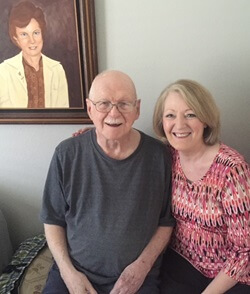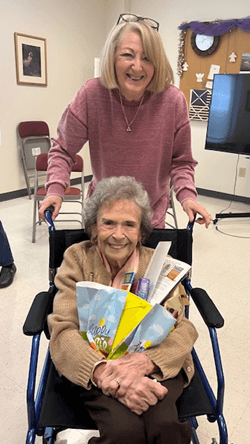“Growing older is easy, all you have to do is breathe. Aging faithfully is different, because it requires intentionality. It’s saying, ‘I’m going to continue to grow and live with purpose until my last breath,’” observes Missy Buchanan, an author, speaker, advocate for older adults and lifelong United Methodist.
Books that support aging faithfully
Missy Buchanan has authored eleven books, ranging from devotionals and encouragement for older adults to advice for those caring for aging family members. Peruse her collection of books, all published by Upper Room Books.
Whether you find yourself wondering how to live a more purposeful life, you are caring for someone who is yearning for direction, or your church is seeking new ways to connect with older congregants, find guidance in these practical tips.
Don’t get stuck
“I look at aging as being a journey. … We can prepare ourselves to pivot instead of getting stuck,” encourages Buchanan. She offers these ideas to older adults:
- Do something new every day. If you watch a lot of cable news, watch a documentary. If you usually read romance novels, read a biography. She advises, “Be intentional about opening your mind to the things of the world.”
- Make the best of where you are. She asks, “What can you do where you are now? How can you influence people?” She mentions a 99-year-old man with limited mobility who was questioning his purpose in a senior living facility. He was known as the “high five guy” and he consistently changed the trajectory of the day for those around him through joy and a shared smile, often from across the room. He felt that his influence wasn’t significant, but Buchanan told him, “In God’s economy, that is everything.”

Buchanan visited John Quinlan (left) weekly for years until his death. She reflects, “He taught me much about lifelong learning. He was the most curious individual that I’ve ever known. He took up painting following a stroke, as part of his rehabilitation. The picture on the wall is one that he painted of his late wife.” Photo courtesy of Missy Buchanan.
“Embrace your purpose. What you are able to do may not look the same as it did once upon a time, but it’s still so important,” says Buchanan.
The Church can fill the gaps
When visiting her mother in a senior living facility, Buchanan learned that it had been six months since anyone from her local church had contacted her. Buchanan had grown up in the congregation and her parents were pillars in many ministries.
Buchanan would also frequently hear a heartbreaking exchange at the facility. People would ask each other, “What are you doing today?” or “How are you doing today?,” and the answer would often be, “I’m just here.”
“I assumed the Church was there. … I thought, ‘Okay, Church, we have got to step up.’ Not just Methodist churches, but all churches,” remembers Buchanan. “What breaks my heart is when I see people who have lost that sense of purpose. And so to me, that's the biggest role of the church: Helping them find purpose. That's going to mean stepping out and thinking of things differently. … I know it is hard work, but I think we could do a better job.”
Ideas for local churches
Buchanan encourages congregations to invest in spiritual formation initiatives for people through the end of life. She explains, “I don't believe coddling older adults is helpful. I believe in both encouraging and challenging them. If spiritual formation is to continue through late life, we must keep growing and learning!”

After the COVID-19 pandemic, Buchanan revived an older adult Sunday School class, now held on Thursday mornings, with transportation provided. Buchanan shares, “I love expanding their horizons.” Jo Leonard (bottom), a member of the class, passed away recently at age 98. Photo courtesy of Missy Buchanan.
Here are some practical ways to stay engaged with older adults:
- Meet people where they are and find out what they need. Do they miss attending a Sunday School class? Are they able to access Holy Communion? Is someone calling them every week to chat?
- Have an awareness of older adult church members, including their health, living situation and life changes, such as a move. Establish communication with family members by asking them to send text message updates to a member of the church.
- Continue to connect with older adult members individually and find out what communication tools they prefer. Some will be comfortable with text messaging, while others will prefer mail.
- Nurture relationships. Buchanan challenges volunteers to learn 100 things about each person they visit as a way to truly get to know them as they connect on a deeper level.
- Be creative with ministry formats. For example, host a Bible study class on a weekday morning and offer to provide transportation. The calmer environment and familiar surroundings will be a comforting place for a small group to gather.
- If older adult members cannot attend church in person, make sure they have access to spiritual growth opportunities. Ensure a chaplain visits their place of residence, that they have access to your online worship services, or that small teams of lay people or pastors visit regularly to lead worship and offer fellowship.
- Host a seminar for adult children who are searching for ways they can support their aging parents.
- Offer caregiver support groups so that you can better understand the needs of families.
Laura Buchanan works for UMC.org at United Methodist Communications. Contact her by email.
This story was published on May 6, 2025.





